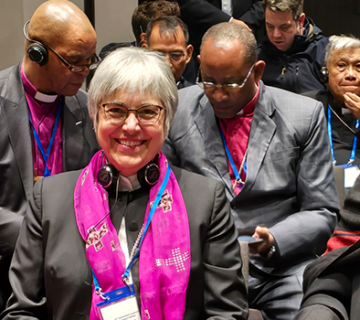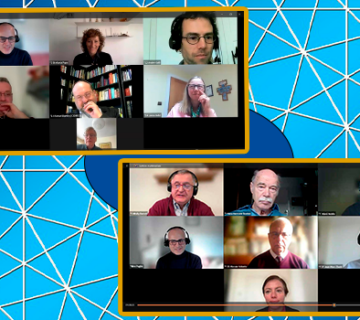In the heart of Holy Week, we publish this thought of Chiara Lubich taken from a conference call on Holy Thursday 1989.
Today is Holy Thursday, a very special day for us. It reminds us of various divine truths that are at the heart of our spirituality, so much so that every year, when this feast occurs, it captivates our hearts. In fact, it’s not unusual to feel an atmosphere of paradise invade our soul.
How can we not feel our hearts expand when Holy Thursday so strongly underlines the new commandment of Jesus, his last prayer for unity, the extraordinary gift of the Eucharist and the priesthood that makes the Eucharist possible? Let’s pause today and consider with immense gratitude these extraordinary mysteries which are fundamental for every Christian, and in particular for us.
And tomorrow is Good Friday. It too takes us right into the heart of Christianity and of our spirituality: Jesus dies, he dies forsaken. Doesn’t this seem like the moment to face, in some way, a subject that few people, if any, want to face in a world like ours that is so caught up in consumerism and other evils – namely the subject of death?
We have to do it, in order to be faithful to our Ideal which teaches us how to face every moment in our life, and therefore, also the passage from this life to the next, which is eternal. And we will address this subject remaining within the topic of “prayer,” which we have chosen to live in these past few weeks.
There is one very short prayer that is stupendous. The Holy Spirit puts it on the lips of the Church, the “bride.” It is addressed to Jesus, the “bridegroom.” It concludes the Book of Revelation, the last book of the Bible. The prayer says, “Come, Lord Jesus!”[1]
“Come, Lord Jesus!”
This prayer could be ours when we think of our death, when we are awaiting it, when we are preparing for death. Yes, because we have, or we should have, our own precise concept of death, which is that it’s not the end, but the beginning. It is our encounter with Jesus. And we know that it’s not optional, everyone has to face it. In fact, that day will come for everyone; it’s God’s will for everyone. Yes, it’s the will of God for me, for us, for each person. If this is true, then we have to learn how to welcome death as it is, as the will of God.
But how in general do we accept God’s will? We have understood that the will of God, whatever it is, is an expression of God’s love for us. It is neither logical nor should we only be resigned to accepting it. It’s necessary to see it as the best thing that could possibly happen to us. Therefore, we have to strive to live in such a way that God’s will is our will.
And we commit ourselves to living the will of God not only with all our love, but also with enthusiasm, because we know that by doing the will of God, we are setting out on a divine adventure, which we know only in part and in part we still have to discover. We also know that this is the way that we can fulfil God’s plan for us.
Indeed, this way of facing God’s will is characteristic of a focolarino, because this is the point that led to our initial conversion, when our lives changed direction totally. …
“Come, Lord Jesus!” …
But this prayer is also good for other occasions. You can say, “Come, Lord Jesus,” while waiting to receive the Eucharist. You can say it before meeting somebody or a group of people in whom you truly want to love him. And you can say it before carrying out any other will of his.
“Come, Lord Jesus! Looking at you, we will be fearless in loving, which is our vocation. While waiting for you to come for us, we will live our life well, so that as soon as the next life opens up for us, we will plunge into that adventure that will never end. You have conquered death. And through this prayer we realize that you, from now on, have conquered death in us, too, in our heart. So then come, Lord Jesus, always, in all of us.
Chiara Lubich
[1] Rev 22:20.


 Italiano
Italiano Español
Español Français
Français Português
Português




God bless you
Muchas gracias!
Buona Pasqua a Tutti!
Buongiorno,
il pensiero di Chiara Lubich sul giovedì santo del 1989 è in continuità con la pubblicazione Parola di Vita che ho letto varie volte, e sempre attuabile.
Grazie! Buon Giovedì Santo, in unità